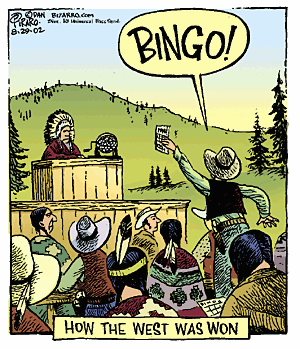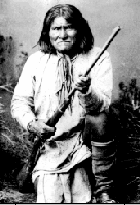 Another Stereotype of the Month entry:
Another Stereotype of the Month entry:
 Another Stereotype of the Month entry:
Another Stereotype of the Month entry:
COMMENTARY
Don't bet on casino in Botkins
By Leigh Allan
Dayton Daily News
Boy, it sure looks like the odds Botkins (please note the clever use of a phrase remarkably akin to the Elizabethan mild oath "odds bodkins," which you have to admit gives this column a certain panache of the classical, even Shakespearean mode) will one day sport a casino owned by the Eastern Shawnee are getting a lot shorter.
Which makes you wonder whether Native American tribes aren't going in for a little ancestor criticism these days.
This week, officials of the tribe were in the Shelby County village of 1,205 folks to chat about the future of the land the tribe hopes to acquire. Botkins officials and businesspeople apparently mostly support the casino idea, while some area folks don't like the possible impact of legalized gambling, given that, as we all know, as Botkins goes, so goes Fryburg.
The Eastern Shawnee, who operate a bingo, slots and off-track betting operation along the Oklahoma-Missouri line, have talked about opening a whole string of casinos in Ohio. If they succeed in using Native American rights to open even the one in Botkins, they could set off a casino boom that would keep the millions of workers now building schools across the state employed for another decade because there are lots of tribes who used to populate Ohio who are going to want a piece of the action.
There's a lot of action to be had.
Over years of visiting family there, I've watched the Soaring Eagle casino in Mount Pleasant, Mich., go from a little bingo hall to the biggest casino east of the Mississippi, complete with a luxury hotel and a showroom that brings in big-name acts. Last year, each adult member of the Saginaw Chippewa got $78,000 from the profits, along with the benefits of added facilities and services on their reservation. The casino also has led to big bucks for outsiders who have put up motels, restaurants and such.
The money has led to major battles over who gets to be counted as a Saginaw and to lobbying battles between tribes and Michigan racetrack owners, who, like their Ohio counterparts, want all the gambling bucks at their own "racinos." The Saginaw have spent millions on lobbying fees, and the racetracks even managed to get a legislator to file a bill (ultimately unsuccessful) to put tolls on roads leading to tribal casinos.
Which brings us back to the normally venerated ancestors.
If enough Native American casinos are set up to appease the desire of palefaces to sit plunking coins into a machine for hours on end, the tribes eventually will be rich enough to buy back all the land that was stolen from them. But given the added cost of land improvements and inflation and all, that may take generations.

How much smarter it would have been if, a couple of centuries ago, chiefs figured out it was useless to fight rifles and cannons with bows and arrows and instead greeted invaders with craps tables, pull tabs and crude devices where you pull a stick to make pictures whirl around. They would have won all the armaments and supplies and sent the white folks scurrying away in their long johns.
Not only would the tribes still freely roam North America, but after the would-be settlers sent word back to their homelands and flocks of their relatives sailed over on party boats for casino weekends, they'd own most of Europe, too.
Rob's reply
In his op-ed piece, Leigh Allan offers a couple of mildly inflammatory statements and one whopper of an insult against Indians. To wit:
>> there are lots of tribes who used to populate Ohio who are going to want a piece of the action. <<
They won't get a piece of the action until they're federally recognized, take land for a casino into trust (which no tribe has done yet from another state), sign a compact approved by the state's governor and legislature, and get the Dept. of Interior's approval too. With all those checks and balances, I wouldn't worry about a plethora of casinos from "tribes who used to populate Ohio."
>> Last year, each adult member of the Saginaw Chippewa got $78,000 from the profits, along with the benefits of added facilities and services on their reservation. <<
The added benefits come first. By law, tribes must use gaming revenues to meet the economic and social needs of the tribe as a whole. Only after they do that can they distribute per capita payments.
>> If enough Native American casinos are set up to appease the desire of palefaces to sit plunking coins into a machine for hours on end, the tribes eventually will be rich enough to buy back all the land that was stolen from them. <<
"Palefaces" is a stereotype of non-Indians. And tribes will never earn more than a fraction of the value of the land taken from them. Allan's comment implies the Indians will be "even" soon with all the income they're getting, in which case we won't "owe" them anything.
In fact, they wouldn't be even unless we gave a third or half the country back. Since that's not about to happen, Allan's hyperbole is worthless. He's trying to turn people against Indians while pretending to be sympathetic to their historical plight.
>> How much smarter it would have been if, a couple of centuries ago, chiefs figured out it was useless to fight rifles and cannons with bows and arrows and instead greeted invaders with craps tables, pull tabs and crude devices where you pull a stick to make pictures whirl around. <<
The notion that Indians weren't smart enough to fight the white men is the really objectionable part of this essay. This notion is wrong on several counts:
1) Indians adopted firearms almost as soon as they learned about them. The idea that Indians fought only with bows and arrows is something out of old Westerns.

Look at the classic picture of Geronimo. What do you see? Yes, a rifle. He "figured out" that fighting fire with fire was a good idea. That wasn't enough to stop the US Army from hunting him down like a rabid animal.
2) The Indians almost defeated the white men conclusively at two points: when Cortés attacked the Aztecs and when William Henry Harrison attacked Tecumseh's forces. Had they won either battle, we wouldn't be hearing about how ignorant Indians were.
3) Indians won many battles when the two sides were equal. In the long run they lost the war(s) because the whites had superior numbers and learned how to play the Indians against each other. Another major factor was how the whites weakened the Indians by subjecting them to disease and taking away their livelihood (e.g., by killing the buffalo). The disparity in arms was a minor factor compared to these.
4) Many Indian nations never fought the US. They signed treaties as equal partners before hostilities forced them to act. The US "won" against these tribes by breaking their word, which the Indians thought they'd keep. This may show naiveté—who would've guessed the white men were no more moral than wolves—but it doesn't impugn their martial abilities.
Related links
Uncivilized Indians
Savage Indians
|
. . . |

|
All material © copyright its original owners, except where noted.
Original text and pictures © copyright 2007 by Robert Schmidt.
Copyrighted material is posted under the Fair Use provision of the Copyright Act,
which allows copying for nonprofit educational uses including criticism and commentary.
Comments sent to the publisher become the property of Blue Corn Comics
and may be used in other postings without permission.